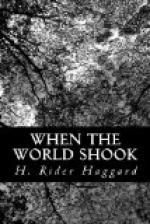We passed on and came to a barn with wide doors that swung a little in the wind, causing the rusted hinges to scream like a creature in pain. On each of these doors hung a dead man crucified. The hat of one of them lay upon the ground, and I knew from the shape of it that he was a Colonial soldier.
“Did you not tell me,” said Oro after surveying them, “that these Germans are of your Christian faith?”
“Yes; and the Name of God is always on their ruler’s lips.”
“Ah!” he said, “I am glad that I worship Fate. Bastin the priest need trouble me no more.”
“There is something behind Fate,” I said, quoting Bastin himself.
“Perhaps. So indeed I have always held, but after much study I cannot understand the manner of its working. Fate is enough for me.”
We went on and came to a flat country that was lined with ditches, all of them full of men, Germans on one side, English and French upon the other. A terrible bombardment shook the earth, the shells raining upon the ditches. Presently that from the English guns ceased and out of the trenches in front of them thousands of men were vomited, who ran forward through a hail of fire in which scores and hundreds fell, across an open piece of ground that was pitted with shell craters. They came to barbed wire defenses, or what remained of them, cut the wire with nippers and pulled up the posts. Then through the gaps they surged in, shouting and hurling hand grenades. They reached the German trenches, they leapt into them and from those holes arose a hellish din. Pistols were fired and everywhere bayonets flashed.
Behind them rushed a horde of little, dark-skinned men, Indians who carried great knives in their hands. Those leapt over the first trench and running on with wild yells, dived into the second, those who were left of them, and there began hacking with their knives at the defenders and the soldiers who worked the spitting maxim guns. In twenty minutes it was over; those lines of trenches were taken, and once more from either side the guns began to boom.
“War again,” said Oro, “clean, honest war, such as the god I call Fate decrees for man. I have seen enough. Now I would visit those whom you call Turks. I understand they have another worship and perhaps they are nobler than these Christians.”
We came to a hilly country which I recognised as Armenia, for once I travelled there, and stopped on an seashore. Here were the Turks in thousands. They were engaged in driving before them mobs of men, women and children in countless numbers. On and on they drove them till they reached the shore. There they massacred them with bayonets, with bullets, or by drowning. I remember a dreadful scene of a poor woman standing up to her waist in the water. Three children were clinging to her—but I cannot go on, really I cannot go on. In the end a Turk waded out and bayoneted her while she strove to protect the last living child with her poor body whence it sprang.




